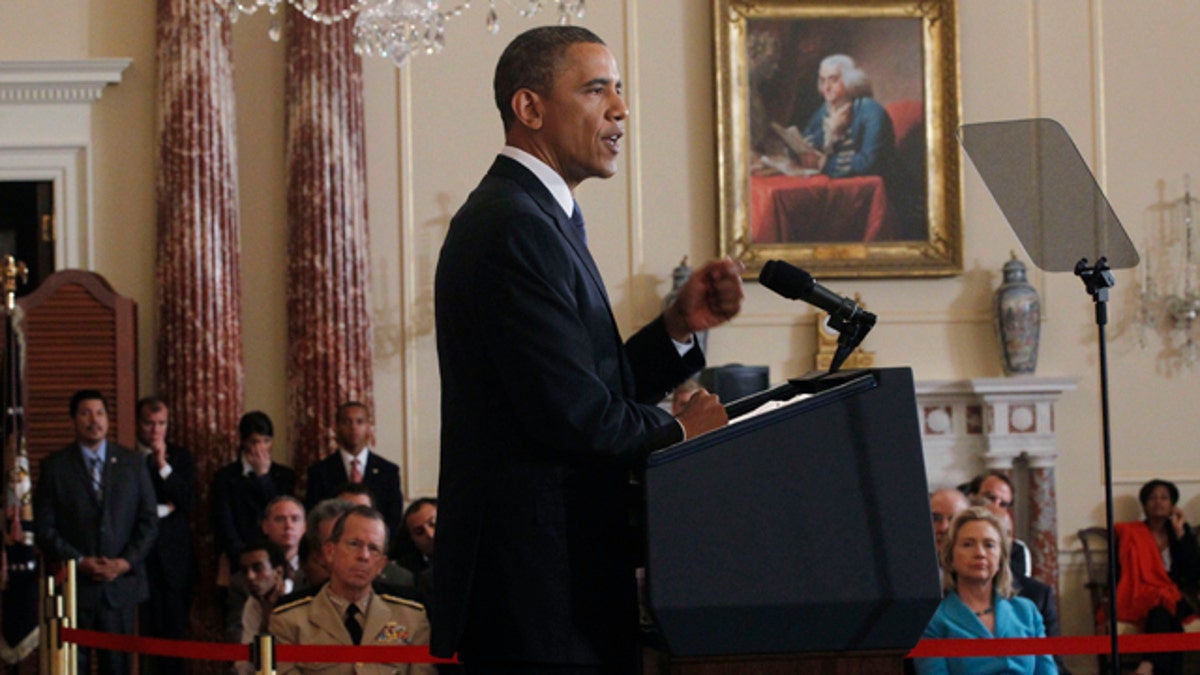
May 19: President Barack Obama delivers his Middle East speech at the State Department in Washington. (AP)
MOSCOW -- Palestinian leaders said Tuesday on a visit to Moscow that President Barack Obama's recent Mideast speeches have been insufficient and contradictory.
Azzam al-Ahmed, the chief negotiator for the Palestinian Fatah faction, described Obama's endorsement of Israel's 1967 borders as a "positive signal, which is regrettably insufficient," adding that subsequent statements by Obama sounded discouraging.
In a speech last Thursday, Obama endorsed the Palestinian position on the borders of their future state, saying it should be based on Israel's borders before the 1967 Mideast war. Israel captured the West Bank, east Jerusalem and Gaza Strip in the fighting, and the Palestinians claim those areas for their state.
At the same time, Obama reiterated his request that the Palestinians drop their plans to appeal for recognition at the U.N. this fall.
Al-Ahmed said that the Palestinians believe the move is necessary to overcome a deadlock in peace talks. "We aren't planning to unilaterally declare independence," he said.
Obama also raised tough questions about an emerging Palestinian unity government that is to include Hamas.
Earlier this month, Palestinian factions signed a landmark pact to end a longtime rift between the two main Palestinian movements, Fatah in the West Bank and Hamas in the Gaza Strip. They also agreed to form a caretaker government.
Israel has described the deal as a deadly blow to peace, saying it won't negotiate with a Palestinian government that includes the Iranian-backed group.
Obama referred to Hamas in his Sunday's address to the American Israel Public Affairs Committee, a powerful pro-Israel lobby, saying that no country can be expected to negotiate with a terrorist group sworn to its destruction.
"Obama's statements can be seen as an attempt to assuage Israel," said Moussa Abu Marzouk, a top Hamas leader who was among the Palestinians on a visit to Moscow. He shrugged off the U.S. and Israeli criticism of the reconciliation deal.
"The U.S. and Israel had cast the rift between the Palestinians as the main obstacle to peace," he said. "And now when we have reached a reconciliation agreement, they say it's an obstacle to peace. Which of these two positions is correct?"
Russia's foreign minister strongly backed the reconciliation deal, saying at Monday's meeting with the Palestinians that it would help advance the Mideast peace process.
Abu Marzouk on Tuesday bristled at Obama's call for the recognition of Israel, saying that would mean recognizing Israel's sovereignty over what they see as the Palestinian lands.
"For me and my Palestinian comrades, the recognition of Israel would amount to recognizing that we have forgotten our home, our lands," Abu Marzouk said. "That's why we can't recognize Israel."
Al-Ahmed said that the Palestinian leadership was to hold a meeting in Ramallah Wednesday to determine its stance regarding Obama's statements.







































